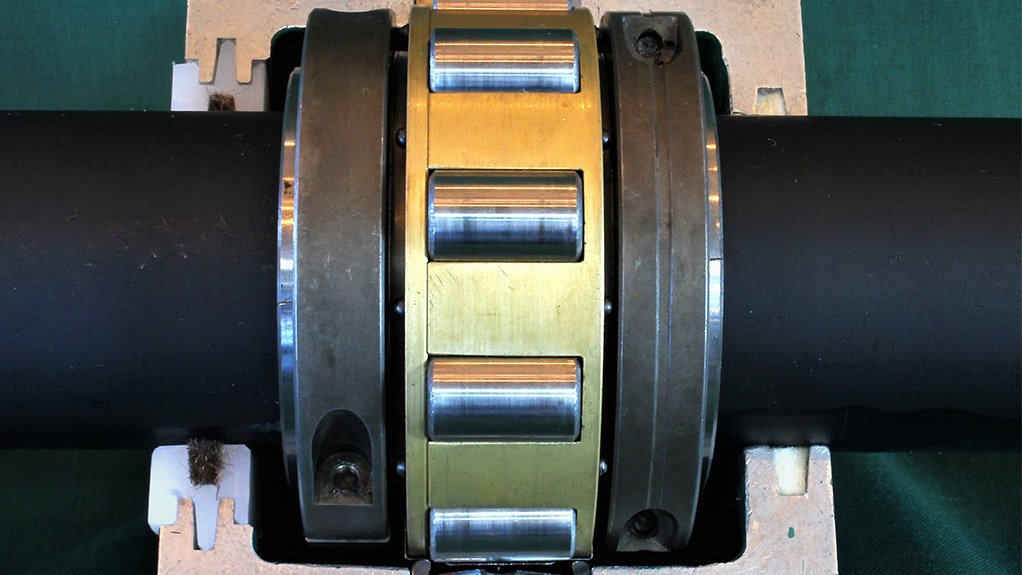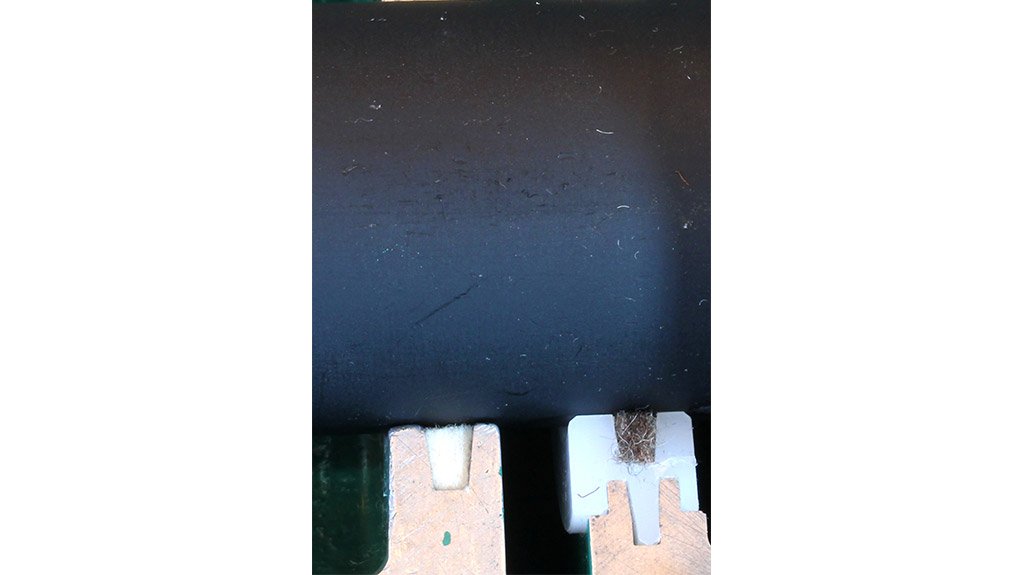Sealing solution prevents shaft damage



INDUSTRY CONCERN OE Bearings has identified that shaft damage caused by undetected bearing failure is costly
INVALUABLE TIME OE Bearings’ sacrifice seal solution provides end-users with time to detect and address a failed bearing before shaft damage occurs
Split roller bearing specialist OE Bearings (OEB) has developed and patented a new sealing solution to prevent costly shaft damage in the event of bearing failure.
OEB founder and MD Warwick Steinhobel tells Engineering News that the company first undertook the development of the new sealing solution in 2016, owing to a “resounding outcry” from its client base.
“While visiting chemicals company Tronox, OEB had a discussion with Tronox mechanical supervisor Herman Zandberg, who lamented the shaft damage on the conveyors. Zandberg remarked that it was strange that there was no seal on the market that could prevent such damage.”
This prompted research into how prevalent Zandberg’s concerns were among the rest of the OEB client base. Steinhobel states that, upon further investigation, a significant portion of its client base, as well as its own sales engineers, had often come across costly and time-consuming shaft damage caused by unpredicted bearing failure.
Steinhobel explains that when a plummer block bearing begins to wear and disintegrate, the bearing lubrication also fails, which leads to the cage inevitably collapsing.
“Once the cage fails, the rolling elements are no longer guided and disperse in all directions at the bottom of the housing. As soon as the rolling elements stop rolling, sliding friction occurs, flattening the rollers and the shaft starts dropping down. The shaft eventually makes contact with the cast iron housing in the seal area, causing damage to the housing and the shaft.”
He emphasises that, while the plummer block housing can be changed, it is difficult and expensive to change the shaft itself and, owing to the exorbitant costs and time associated with changing out a systems shaft, many clients opt to fit a new bearing on an already damaged shaft.
“However, using a damaged shaft results in a large gap forming between the shaft and the housing, causing ineffective sealing and allowing dirt to enter through this gap. This leads to premature failure of the new bearing.”
Steinhobel states that, while early detecting of bearing wear can prevent detrimental shaft damage, bearing failure is difficult to detect making it almost impossible to predict. He further adds that this is particularly true on long conveyors where monitoring is difficult.
After OEB identified the extent of the shaft damage, it began in-house testing to find a solution to protect the shaft system upon bearing failure. This involved testing various sacrificial seal materials on OEB’s in-house test rig. “The company removed the cage and rollers from the test bearing and ran the shaft on the seals, thereby simulating a bearing failure,” avers Steinhobel.
OEB subsequently developed a sacrificial seal carrier that provides effective sealing, yet, in the event of failure, the carrier would wear away without damage to the shaft. At slower rotation speeds of about 100 rpm – at which a conveyor typically operates – the sacrificial seal lasted several hours before wearing away, but at higher rotation speeds of about 1 000 rpm – at which a fan typically operates – the wear was faster. However, Steinhobel stresses that, in all cases, there was no shaft damage during the bearing failure.
“This provides the end-user with invaluable extra time to spot and address a failed bearing before shaft damage occurs, potentially reducing unforeseen expenses dramatically.”
He adds that OEB has approached clients who requested a way of protecting shafts to test the sacrifice seal solution in active plants. The testing process is ongoing and OEB hopes to stock the new seal in bulk and actively market its distribution to industries after final-round testing is complete.
All industries that use plummer blocks and split roller bearings can potentially benefit from OEB’s new sacrificial seal design, states Steinhobel.
The technology will be applicable in mining, steel mills, paper mills, sugar mills, harbours, ships and cement plants, besides others. Typical application could include instillation on conveyors, fans, mill pinions, cookers, winders, apron feeders, scrubbers and spray booth conveyors.
Article Enquiry
Email Article
Save Article
Feedback
To advertise email advertising@creamermedia.co.za or click here
Announcements
What's On
Subscribe to improve your user experience...
Option 1 (equivalent of R125 a month):
Receive a weekly copy of Creamer Media's Engineering News & Mining Weekly magazine
(print copy for those in South Africa and e-magazine for those outside of South Africa)
Receive daily email newsletters
Access to full search results
Access archive of magazine back copies
Access to Projects in Progress
Access to ONE Research Report of your choice in PDF format
Option 2 (equivalent of R375 a month):
All benefits from Option 1
PLUS
Access to Creamer Media's Research Channel Africa for ALL Research Reports, in PDF format, on various industrial and mining sectors
including Electricity; Water; Energy Transition; Hydrogen; Roads, Rail and Ports; Coal; Gold; Platinum; Battery Metals; etc.
Already a subscriber?
Forgotten your password?
Receive weekly copy of Creamer Media's Engineering News & Mining Weekly magazine (print copy for those in South Africa and e-magazine for those outside of South Africa)
➕
Recieve daily email newsletters
➕
Access to full search results
➕
Access archive of magazine back copies
➕
Access to Projects in Progress
➕
Access to ONE Research Report of your choice in PDF format
RESEARCH CHANNEL AFRICA
R4500 (equivalent of R375 a month)
SUBSCRIBEAll benefits from Option 1
➕
Access to Creamer Media's Research Channel Africa for ALL Research Reports on various industrial and mining sectors, in PDF format, including on:
Electricity
➕
Water
➕
Energy Transition
➕
Hydrogen
➕
Roads, Rail and Ports
➕
Coal
➕
Gold
➕
Platinum
➕
Battery Metals
➕
etc.
Receive all benefits from Option 1 or Option 2 delivered to numerous people at your company
➕
Multiple User names and Passwords for simultaneous log-ins
➕
Intranet integration access to all in your organisation




















